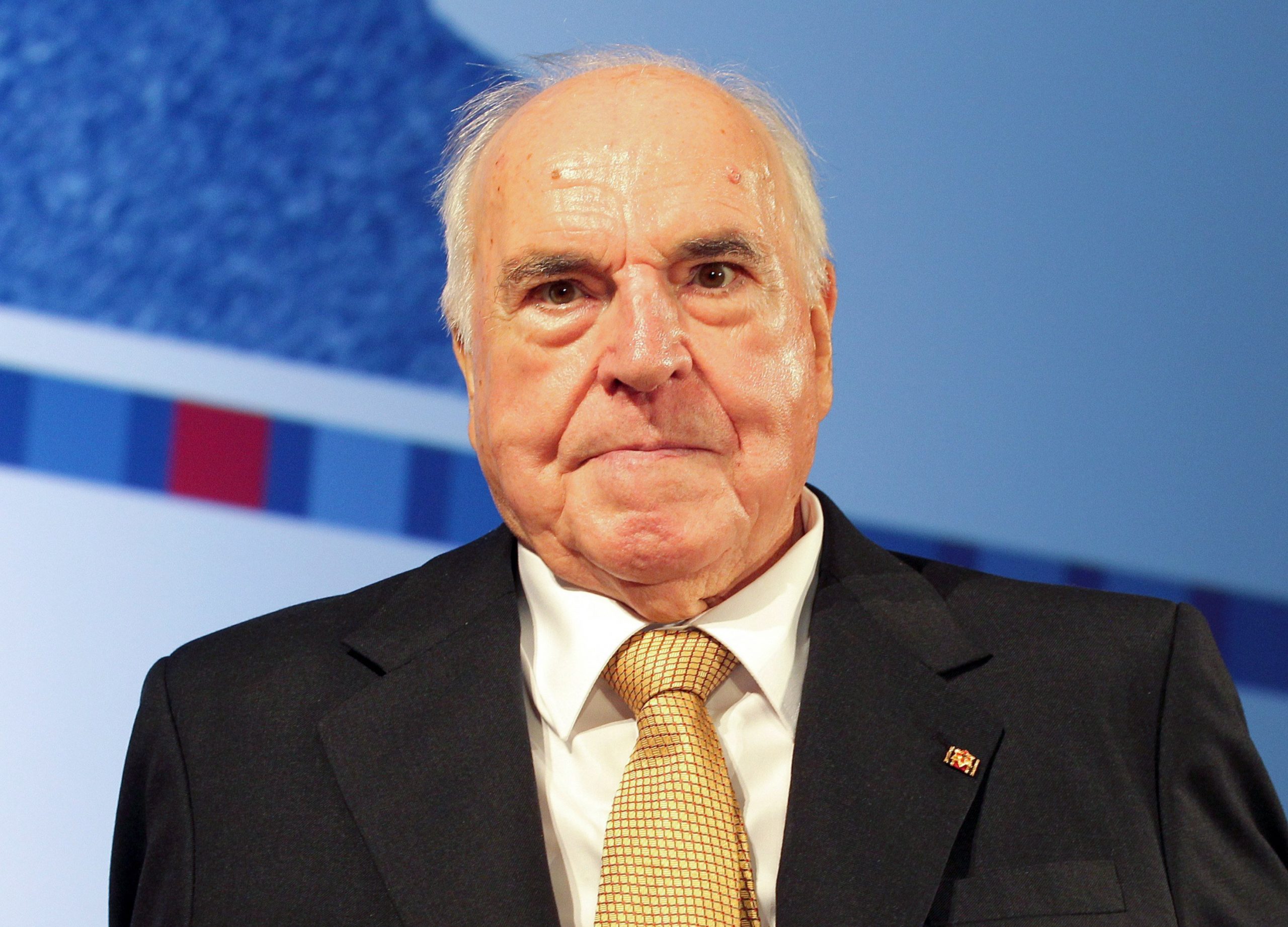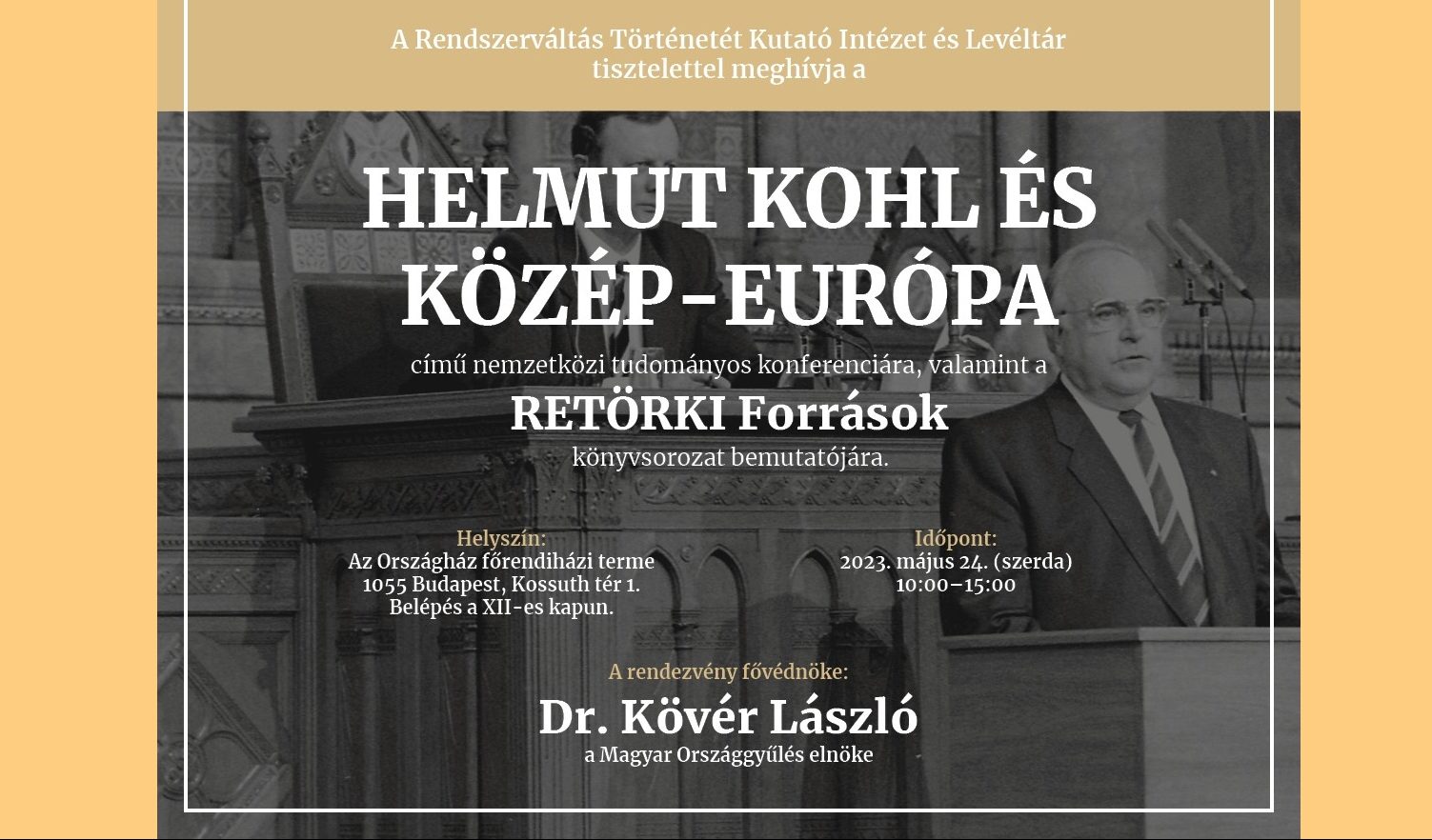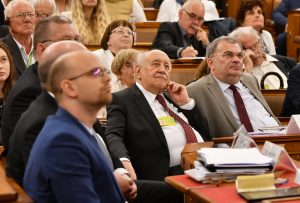
"He was the right man at the right time, a statesman who rightly recognised a one-time opportunity and acted accordingly," Gulyás said.Continue reading

Last year was marked by a double anniversary: 2022 marked the fifth anniversary of Helmut Kohl’s death and the 90th anniversary of József Antall’s birth. These two great politicians were influential figures not only in their countries but also in Europe.
To mark the occasion, the Institute and Archive for Research on the History of Regime Change (RETÖRKI), with the support of the National Culture Fund (NKA), organized a scientific conference on May 24, 2023, in the Upper House of Parliament. The conference was held under the patronage of Dr. László Kövér, the President of the Hungarian Parliament.
“The turn of the 1980s and 1990s was a time of searching for a new path, when the weakening and later dissolution of the Soviet Union enabled the nations of Central Europe to chart their own democratic course” – said Gábor Nyári, executive director of RETÖRKI in his opening speech. “Today’s international academic conference therefore aims to examine the role of the two conservative politicians in the regime changes in Central Europe, and to explore how the nations that won their freedom sought their own path and how they were connected to each other.”
The conference was addressed by personalities, such as Prof. Dr. Hans Kaiser, former Federal Minister for European Affairs and Minister of the German Länder, Dr. Tamás Fricz, Chief Scientific Advisor of RETÖRKI, and Dr. Endre Marinovich, Deputy Director General of the VERITAS Research Institute, who served as Head of Cabinet of Prime Minister József Antall during the first legislative period after the regime change.
Professor Hans Kaiser emphasized that the friendship between Helmuth Kohl and József Antall also deepened the historical friendship between Germany and Hungary, which then had a lasting impact on the political history of Europe: without Helmuth Kohl, the Berlin Wall and the Iron Curtain separating the two world orders would not have fallen, and József Antall, as the first democratically elected Prime Minister of Hungary, had an undeniable part in ensuring that the regime change in Hungary was carried out bloodlessly, peacefully and democratically. “Helmuth Kohl, as Chancellor of the Federal Republic of Germany never renounced the hope for the reunification of Germany and fought very hard for it. However, it was clear to him that a peaceful regime change could never be accomplished without the cooperation of the Soviet Union, so he established political relations with Michael Gorbachev to find the way to each other.”
Helmuth Kohl was the father of the reunification of Germany Professor Kaiser emphasized.

Prof. Hans Kaiser. Photo: Retörki
What has become of this friendship to this day is another question and should be discussed and analyzed in detail. Kaiser is of the opinion that a strange distancing can be felt between our countries in the last ten to fifteen years, which is difficult to comprehend. He thinks that Germany and Hungary have to do a lot to get closer again and to be able to resolve conflicts and misunderstandings. One thing is for sure – says Kaiser – in order to understand Hungary, you have to live here and get to know Hungarian culture and mentality in this inspiring environment.
Indeed, in today’s world, Germany and Hungary should not fight against each other, but stand side by side and support each other. According to Tamás Fricz, there was no doubt that the Europe of the 1980s and 1990s was full of charismatic politicians and statesmen of great stature, such as Margareth Thatcher, Giscarde D’ Estagne, Jacques Chirac or, on the left, Francois Mitterand, Felipe Gonzalez and Helmut Schmidt. In many respects, however, Helmut Kohl stands out, who is credited with creating the second German unity after Bismarck in 1871.
Helmut Kohl always took the fate of the countries of Eastern and Central Europe to heart, especially that of us, Hungary. Of course, there were historical and cultural reasons for this, and the common past explains this, but it is also clear that Germany has always considered the region they call Eastern Europe, which we rather call Central Europe, as a small part of its own sphere of interest.
“It is not surprising, therefore, that when things began to ferment politically in the late 1980s and the Soviet Union under Gorbachev became increasingly inclined to free the annexed Central and Eastern European countries from the grip of communism and grant them freedom and independence, it was Helmut Kohl who, as West German chancellor, was open to change and clearly signaled that he wanted to help the eastern countries, especially Hungary and Poland, which had been at the forefront of democratization, to overcome the economic crisis and high debt that were essential to stabilizing democracy,” Fricz explained.
“The real prospect that the communist GDR, the eastern half of the formerly united Germany, would break away from the Soviet Union and join not only the camp of the free countries but also the second German unity, the reunification that Konrad Adenauer already had in mind, gave him a special boost. Helmut Kohl was thus facing a particularly great historical moment, and it was fortunate for the Germans that precisely at this historical moment there was a true statesman at the head of the Federal Republic, who took on the considerable geopolitical risks associated with the creation of German unity without hesitation or hesitation” – Tamás Fricz emphasized.
The well-known political scientist added that the willingness of Chancellor Helmut Kohl to help was only strengthened by the fact that in 1989, with the opening of our borders, we made it possible for Eastern Europeans who had fled to us to leave for Austria, and from then on revolutionary processes were set in motion in East Germany, which eventually led to the fall of the Berlin Wall on November 9, symbolically marking the end of the Cold War in Europe.
From then until his death, Helmut Kohl always spoke with great feeling and sincerity about the fact that it was the Hungarians who knocked the first stone out of the Berlin Wall.
Featured Image: Ungarn Heute